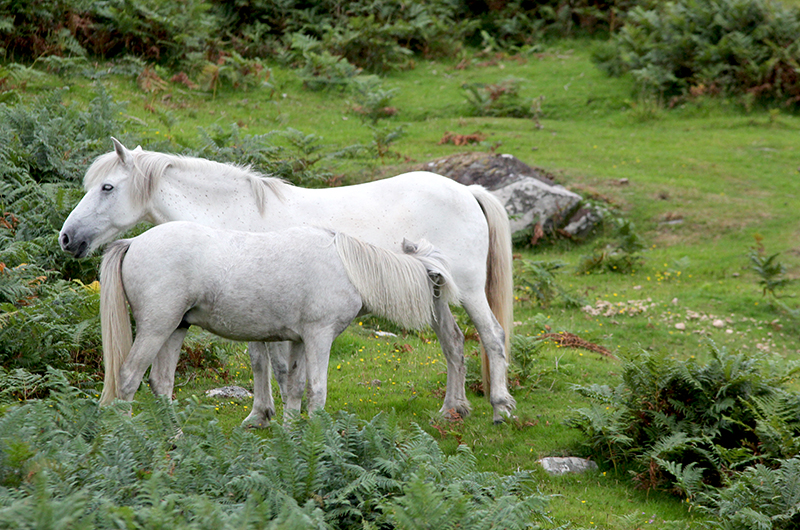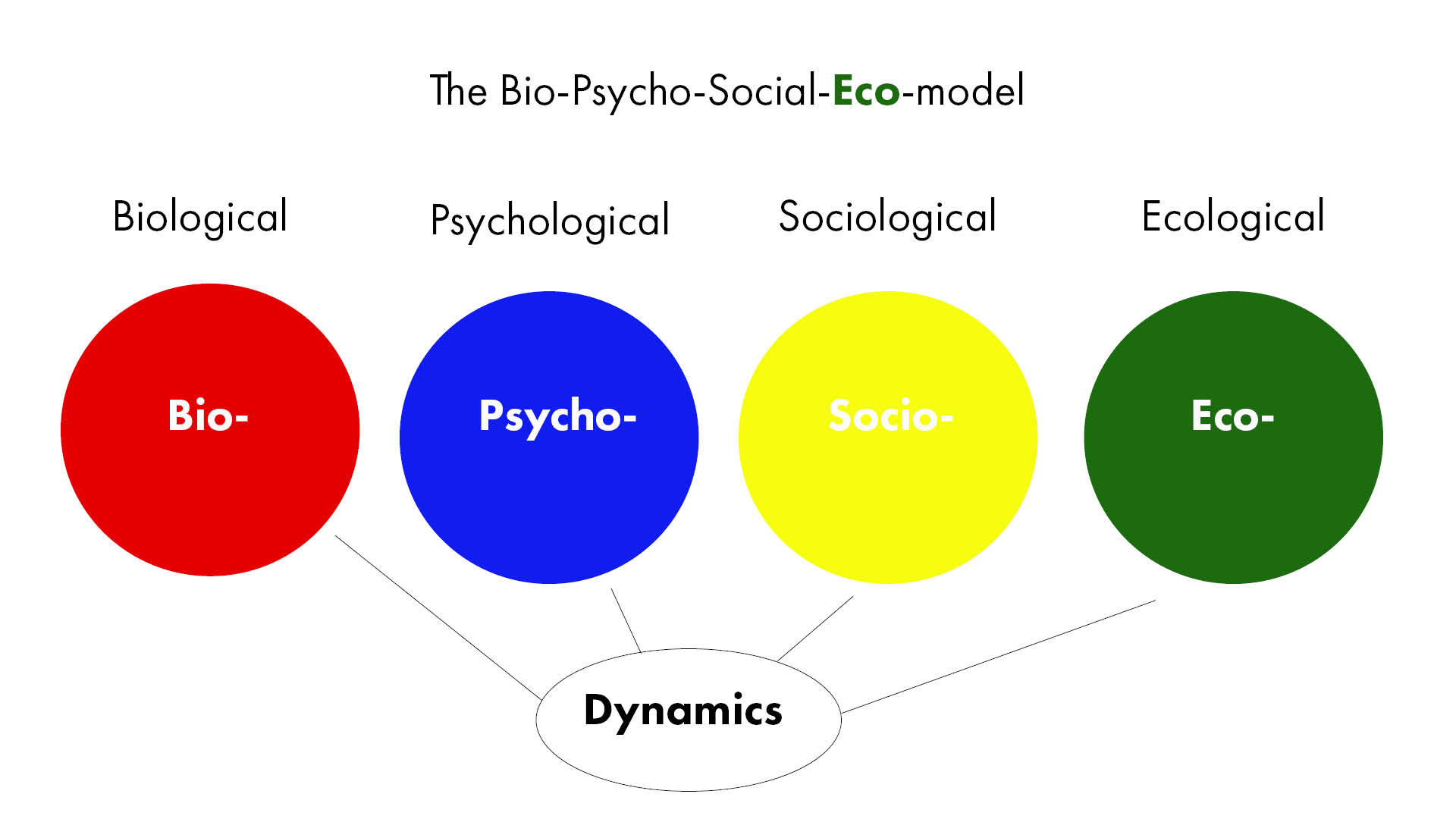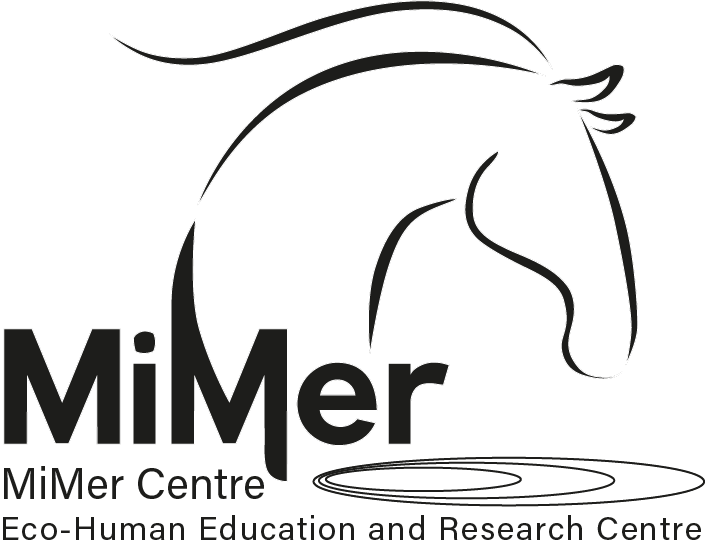 |
| Native Eriskay ponies at the Island of Uist (neighbouring Eriskay). |
What is Rewilding?
Humans are an encultured species. When we have “time over” from pure survival and practical things to do, we rest and recuperate, we enrich ourselves, we challenge ourselves, we share with each other, etc., by engaging in cultural activities, by innovating, by progressing, developing, creating, entertaining. And the more advanced we get, the more we seem to forget the simple pleasures – and our actual need to be connected to nature, to earth, to a bigger context. In our drive to develop, innovate and create, and in disconnection from nature (at large), we also become destructive on a larger scale, as a species, as well individually, one by one.
Bio-Psycho-Social-ECO
The Bio-Psycho-Social model is a psychological model describing how our biology is as important to our wellbeing as our psychology and as our social (in a wider context – relational) environment. We have added a fourth factor to really highlight the importance of being connected also to nature (and thereby to ourselves). We call our model Bio-Psycho-Social-Eco. The ECO part is extra important in working with stress and trauma, as it is also connected with relational aspects in growth work, besides human-human relationallity. It means we also look at and work with ecodynamics, besides working with biodynamics, psychodynamics, and social dynamics.

Rewilding as a trend - or as awareness and ethics
Re-wilding is a trend, an idea, perhaps a need even, to turn the tides, to re-connect with the less uncultured sides of ourselves as humans. A need to become wilder. Of nurturing our wilder sides. And of course, of supporting nature at large and other animals. But even if it is a trend, we work with rewilding long-term and in consistent ways. Even if we offer particular trainings, workshops, sessions etc, that has its main focus on rewilding, it is also always a part of everything we do. It is present as an important awareness and it is visible in our ethics, in everything we do, say and work with.
3 Different Strands of Rewilding
These are 3 different strands of the Rewilding movement – and people and organizations often focus on one or sometimes two of these.
Rewilding Nature
Some focus on rewilding nature around us. To help nature, to help the other animals that are not us, to survive, despite us and our developing, building – that often appropriates other animals’ space.
Rewilding Animals
Some of us focus on rewilding animals. Finding ways to also bring animals raised with humans, or at some point captured, or saved/rescued – back into the wild.
Rewilding people
Others of us focus on rewilding people, in different ways.
All of these rewilding aspects are important. They overlap, often go hand in hand with each other.
In MiMer we promote all of them as important and worthy of our attention, interest, energy and so on. We keep on being a “bridging” organization. Meaning we often take on the responsibility to bridge between organizations, between disciplines, between ideas and perspectives, between goals, between people and cultures, between species, between science and practice, between nature and culture.
MiMer’s Focus in Rewilding
We focus mainly on rewilding people. And secondly on rewilding horses and their environment.
Following this prioritization – we offer our courses and workshops we call “Rewild Your Heart” – often in combination with Nature and/or Equine Assisted Mindfulness, sometimes also in combination with the theme on how to “Rewild Your Horse” and/or their environment. It isn’t easy for us to make clear cuts between different rewilding topics as they overlap, belong together, and affect each other. But each one of our courses and workshops often applies and delves deep into a specific angle of rewilding, focusing on one or two perspectives that we put in the center for that particular offering.
Whatever work we do that concerns rewilding where humans and horses are involved, we use our own methodology, called HEAR (Human-Equine Assisted Rewilding).
Check the left menu here to see what we offer right now. Come back regularly – we keep on adding courses (online and in person), workshops, and other events to our offerings and services.
And for those of you who wants to discuss and/or have supervision/peer supervision on working with Rewilding, Equine, Animal and/or Nature Assisted Mindfulness, Ecopsychology and Ecotherapy/Wild Therapy – from all kinds of perspectives – join us in our online Rewild your Heart Community!
Read more under each course description and contact us if you have any questions: This email address is being protected from spambots. You need JavaScript enabled to view it.
